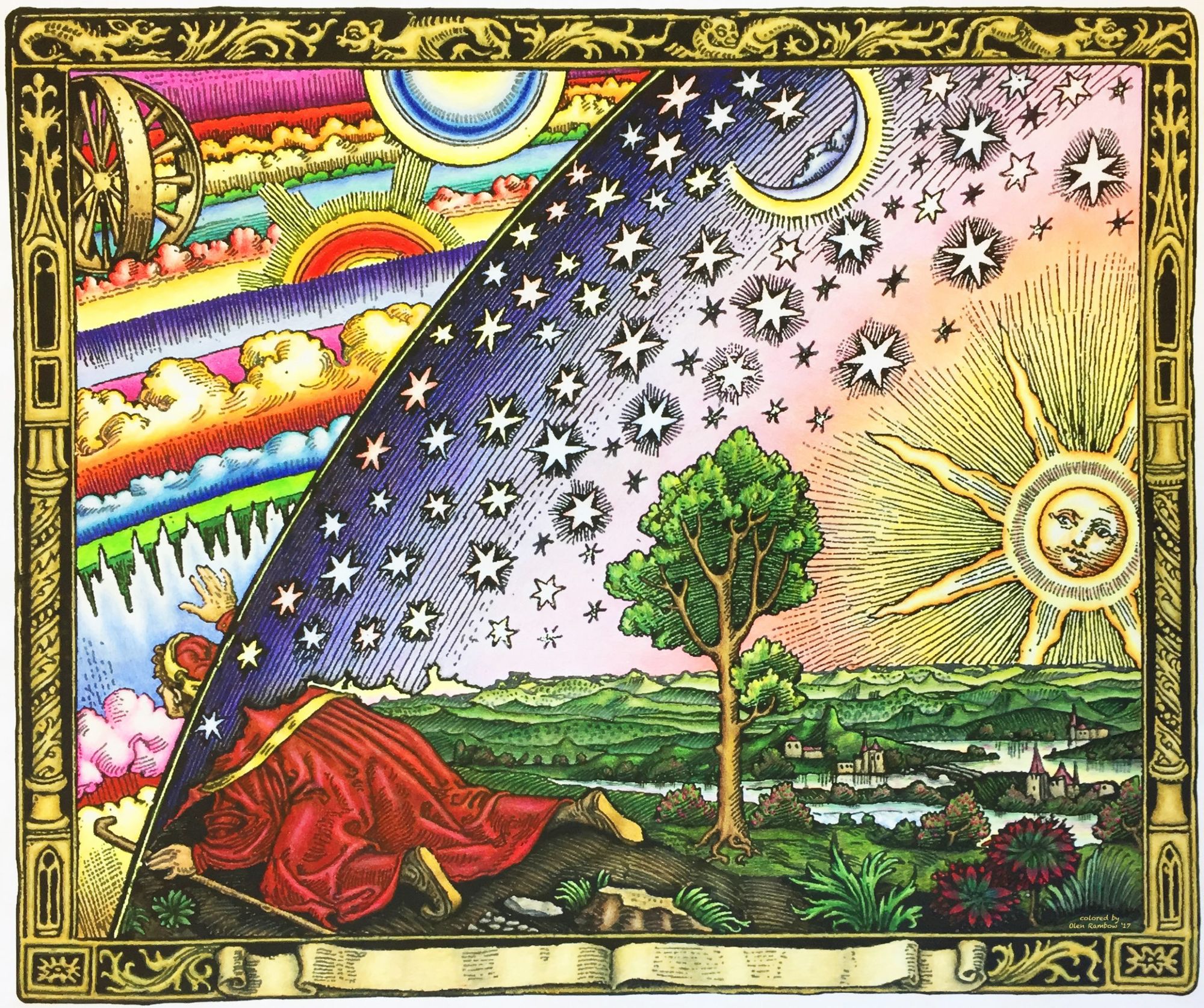In The Theme of Life, or How I Found Order in Randomness, I described my spiritual journey or rather an understanding that I was on one. Now, over a year later, I have learned a wealth more information about the world, both external and internal. It even seems that I knew next to nothing back then. While I surely possess more knowledge now than before, I have come to realize that "next to nothing" is a permanent state, for, in the infiniteness of the Universe, it is the most fitting.
The common thread mentioned in the previous article on spirituality has only been getting clearer. Indeed, anything I do, anywhere I go, anyone I meet has a profound meaning that I failed to perceive previously. Although my thoughts and actions are not always in accordance with Truth, Truth eventually finds me. This makes life a bit challenging, for he who ignores what he knows to be true suffers immensely. But suffering is an inherent part of our earthly existence—this much is true as well.
This article's purpose is to summarize some of what I have been pondering upon and see how it fits in a broader picture of the objective reality that I subjectively perceive.
Ancient Wisdom
The spiritual part of my journey can be summarized by quite a common (in certain literature) theme of a soul that takes a plunge into materiality, suffering amnesia about its origin, only to discover the way back to the world of Spirit gradually throughout its earthly existence.
It is clear to me now that the turning point in my life was the abandonment of atheism, which represents pure materiality of thinking, in favor of agnosticism, which admits that maybe, just maybe, I do not know much about the world and, thus, must reserve my judgement about it. Once that happened, I allowed myself to be open to other ideas and interpretations of the big questions of life itself. At that point, the soul's rise from the claws of Matter began.

I did not make a list of literature to read ("I will read the Bible, the Koran, the Torah and other scriptures to find the Truth!") but rather followed "suggestions" that appeared before me in various circumstances. The "seed" was likely an article or even a comment that I stumbled upon on the expanse of the Internet which ended up with a couple of books in my library that were completely outside the scope of everything I knew. The deep dive began accompanied by awe, amazement and almost regular "a-ha" moments. I could not stop. And why would I? If you learn something that creates a significant emotional reaction in you, a feeling that it is precisely what you need, then you should stick to it and figure out why it is so.
What I got it into has many names, but the most common are esotericism, occultism, theosophy, spiritual science and even alchemy. Needless to say, I had my initial reservations about the whole set, boosted by all kinds of negative remarks about this domain of knowledge by many people. Atheists would naturally deride it as fantasy while adherents of some confessions would go as far as call this ancient wisdom diabolical. I thought to myself, "Generally a good person by many standards, why would I be attracted to such 'demonic' knowledge? Is it the works of the Devil? Am I being misled? Am I actually bad? Are these people right?" Moreover, becoming convinced that our planet is ruled by the Parasites who may also be engaged in "occult practices" and things like satanism, I was on guard about the whole thing.
But time is a healer, and it also heals your thoughts. Right now, I understand that any domain of knowledge is simply a tool to be used for specific purposes. It is the intent of the user that really matters. The Parasites seek out occult teachings to figure out the secrets of the Universe, including those of human nature. Because total domination, subjugation, enslavement are their goals, anything that helps such practices will do; knowing the inner workings of Nature, therefore, is quite beneficial. That is on the one hand. On the other hand, similar knowledge can be used to the benefit of those who seek spiritual enlightenment. To attain spiritual insight, one must be able to penetrate into the mysteries of our world and those invisible to the eye. Ancient esoteric knowledge helps in that regard. Moreover, many notable persons after whom we call so many laws of science today, went quite deep in this direction, too. Isaac Newton was an alchemist.
I do not think that spirituality is unachievable with mainstream organized religion with its dogmas and commandments. On the contrary, many people of high stature, morals and ethics belong to one of the most widespread churches. A few others, however, myself included, find little satisfaction in the confinement of the Church's edicts—the desire to explore is ever burning. Truth be told, at this point, I do not see an end to it. But I also understand that I am but one of the few, and the vast majority are better off with what everybody else does, whether for spiritual purposes or simply out of communal bonds. For this reason, I salute any choice that one makes with regard to spiritual practices provided that the intent is pure. With that, I will keep on my solitary path.
"Blessed are the solitary and the chosen, for you will find the Kingdom. For you are from it, and to it you will return."—Jesus, The Gospel of Thomas
A New Label
If we had to play a game of labels, then, today, I would likely be called a Gnostic by those who know. Naturally, this can and probably will change over time. But right now it feels like the best descriptor.
"Gnosticism [...] occupies a strange region between religion and what today is known as psychology—a region where soul and spirit meet and where dream and vision are transmuted into liberating experience."—Stephan Hoeller
If I were to summarize the principal points important to me that relate to Gnosticism, they would be:
- Matter is evil, Spirit is good
- Based on (1), the material world is inherently evil
- It is possible to liberate oneself from suffering by way of gnosis—a sincere, deep knowledge of oneself's inner nature
To quote the Bible, it all comes down to the following:
- "The kingdom of Heaven is within."
- "Know thyself."
There is a lot more to Gnosticism, and maybe, one day, I will write about it. Today, I am only a beginner in what comprises its theoretical framework. Practice is more important to me, anyway.
An Improved Experience
What is interesting about spiritual science, as Rudolf Steiner called it, is the fact that it permeates all the facets of life. I can apply the useful knowledge I learn from ancient books of wisdom in a variety of situations and conditions. From parenting to social gatherings, from farming to business, from music to coding. Everything in the world follows the same universal principles. These laws of Nature, if learned and observed, can bring forth an understanding of things that was not there before. Slowly but surely, your character starts incorporating this knowledge into daily life, improving its quality greatly.
An important thing to mention is that the road is bumpy. There are ups and downs, achievements and failures. As it should be—according to the Law. Sometimes, progress can be seen quite distinctly as it is right there, on the surface. Other times, it may feel like there is no progress at all for a long time. This is when one has to look inside and rather perceive it. The changes can be so subtle that it takes effort to notice any difference. Remember: when working on the inner side of things, do not always look for results externally.
Throughout millennia, people have graded their level of spiritual enlightenment in various ways. From an apprentice to an Initiate, one could take a journey of a lifetime if only there was an honest desire. I feel that I am still at the beginning of this trip. Will I ever achieve some kind of level that used to bear a noble title in the past? No idea. One thing is for sure: being a student is a permanent condition. There is a graduation party in this material world at some point. But this is not the only world, is it? And so the learning must continue. Forever.

